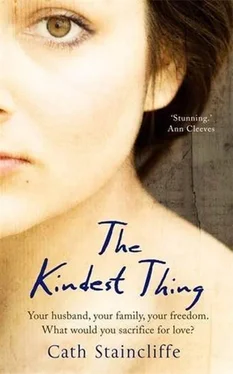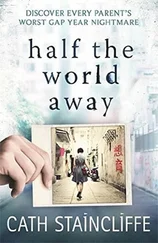Invariably I would return home from those visits feverish with resentment, feeling cheated and miserable. Cheated because I was waiting for death’s drum to make my mother dance to a different beat. I longed for the illness to bring us closer, for her distance and reserve to melt away and for her finally to open up, to share her feelings with me, to acknowledge the difficulties we had had and at last, with the end in sight, to be able to love me. I wanted to be able to tell her I loved her, without feeling it was a love born of obligation not pleasure, that I was sorry we hadn’t shared much enjoyment in life, that we both deserved some reconciliation before the end.
Now and again, I’d make crass efforts to pave the way for this transformation. I would talk about my feelings for Adam or my anxieties about the coming baby and then refer to her own experience. Or I’d ask leading questions about her upbringing. She would always deflect me, never giving an answer but finding some little task for me to perform: switch the TV on, check the thermostat, top up her tea, take a note for the paper shop. Distraction techniques. The sort of thing you try on a toddler in a tantrum.
One day my patience snapped. Wretched with lack of sleep and frightened by how sick she looked (the whey colour of her skin, the peculiar smell, like sour fruit, that came from her), I challenged her outright. When she blocked my opening gambit with some flummery about the fuel bill, I rounded on her. ‘Mum, can’t we just talk like normal people for once? About something other than the bloody gas meter? Can’t we talk about us, about what’s happening?’
She blinked; dots of colour stung her cheeks. ‘I don’t know what you mean.’
‘We never talk about ourselves, about the past or our problems or how we feel. It’s like we’re strangers.’ Tears unshed pressed behind my eyeballs. There was an image in my head. Motherhood idealized. She who would laugh with delight when I appeared, who would drink me in with warm eyes, listening to news of my triumphs and disasters. She who would celebrate my pregnancy and touch my belly, enthralled at the quickening ripple of her grandchild-to-be. She’d sit up late regaling me with tales of life with my father, of my own childhood, confiding in me her own disappointments and regrets. She would send me to bring out the photograph album and demand the latest photos of Adam for her bedside.
She frowned. ‘I don’t-’ She broke off, an expression of defeat on her face. ‘You’re here, Martin comes. That’s not strangers.’
A quiver of frustration vibrated through me. She didn’t get it. Or maybe she pretended not to get it. Could she really think this was enough? Either way I never found the intimacy I craved with her.
The night she died, I was driving to the hospital and my thoughts were circling like vultures, picking over the remains of our relationship. I’d been trying to tell myself that she’d had no choice in how she acted, that her own upbringing, about which I knew little, had made her like this. But in my heart I blamed her. Oh, yes – I had her strung up and crucified with my childish rage.
She died before I reached her. No last words of redemption for me. She lay there, frail and pale, like the husk of something, and I was sad. Not for what I had lost but for what we’d never had. For the absence in our lives.
When it came to my trial they would argue that the spectre of my mother’s painful illness and death, the stress of watching her wither and die, had contributed to tipping me over the edge into killing Neil. That I couldn’t bear to see another person close to me go through that.
They didn’t understand that it wasn’t her death that haunted me. It was the cold embrace of her life.
Dolores Cabril is a small plump woman with protruding teeth, fine brown hair the colour of walnuts and a husky smoker’s voice of a darker shade. She wears a black trouser suit with a tan Paisley blouse, an ensemble that serves to emphasize her short stature. We have already met. She visited me in prison to assess me and to come up with her expert opinion as to whether I was firing on all cylinders when I helped Neil die.
I notice that the jurors are a little more uncertain about her than they have been about the previous witnesses – it’s in the postures they adopt. Mousy’s chin drops lower so that she has to cast her eyes upwards slyly to see the stand. Freckly Alice on the back row has lost her smile and three of the men, smart Media Man, the Cook and Callow Youth, have folded their arms. I assume a mistrust of shrinks is behind it. Perhaps a fear that Dolores Cabril is going to march into uncomfortable territory, spouting about penis envy and incestuous desires, or a notion that she has delved into the nastiest recesses of my mind and is going to drag out the ghastly entrails and drape them round the court.
This defensive reaction is not necessarily good for me because later the weight of my own defence will rest in the arms of my own expert psychiatrist. It is fine if the jury mistrust or dislike her, even better if they dispute her opinion, but if they simply despise the profession then I am way up the creek.
Dolores Cabril is dwarfed by the stand. We can just see her head and shoulders. She raises her hand to the good book and swears to tell the truth. Her voice is alluring. If you close your eyes and listen you might imagine it emanating from a six-foot siren who has wandered out of the steamy Havana of a Graham Greene novel. There’s a tinge of her Spanish mother tongue in the smoke, audible in the way she pronounces ‘truth’; a hard t at the end.
Briony Webber makes a meal of establishing her credentials: the degree from Cambridge, the MA and PhD, the years spent working as a psychiatric consultant, the books, the papers, the time as a forensic psychiatrist at Broadmoor high security hospital, her role as chair of the working party into human rights and mentally ill patients, her position on this and that select committee and the number of court appearances she has made. The MBE.
Hilda and Flo flicker into life at this last revelation and the Cook relaxes his arms and appears to revise his opinion. Beside him the Artist rolls his eyes – a republican I guess, given that the honours system and royalty are still so closely bound together.
Miss Webber continues: ‘Professor Cabril, you first met Deborah Shelley on November the eighth last year. Can you tell the court the purpose of this visit?’
‘This was an opportunity for me to assess Ms Shelley’s state of mind.’
‘Would that be her state of mind on November the eighth?’
‘Yes. And also to hear about the circumstances surrounding her husband’s death and to draw conclusions about her state of mind then,’ she explains.
‘And after meeting Ms Shelley you drew up a report for the prosecution?’
‘That’s right.’ She gives a sharp dip of her chin.
‘Was that report based solely on your meeting with Ms Shelley?’
‘No. I also had access to police interviews and witness statements.’
Miss Webber nods and smiles, giving us the impression that she is pleased with the amount of care that Professor Cabril has put into the case.
‘How did you find Ms Shelley to be at your meeting last November?’
‘Functioning well, displaying normal reactions to her bereavement and incarceration.’
She imbues the last word with the tang of Spanish and I imagine Styal transformed, sweltering in a sun-baked landscape, dried mud walls and a corrugated-tin roof, the whine of mosquitoes, pitiless thirst, cockroaches and screams from the ‘interview’ room down the end of the corridor.
‘Can you please take the jury through the summary of your findings on page three?’ Miss Webber gives Professor Cabril the report and clears it with the judge. ‘Your Honour, I am now passing Professor Cabril a copy of the report that is included in the case papers.’
Читать дальше












